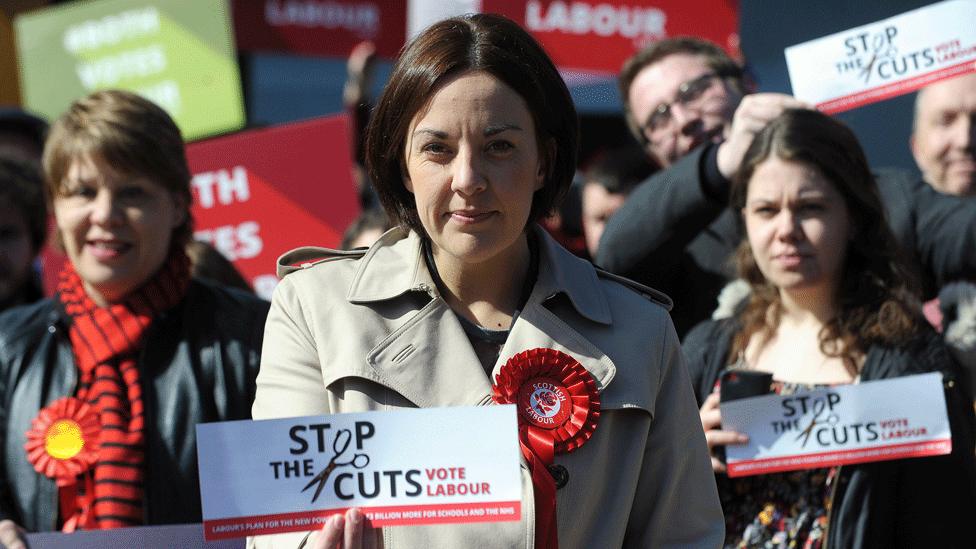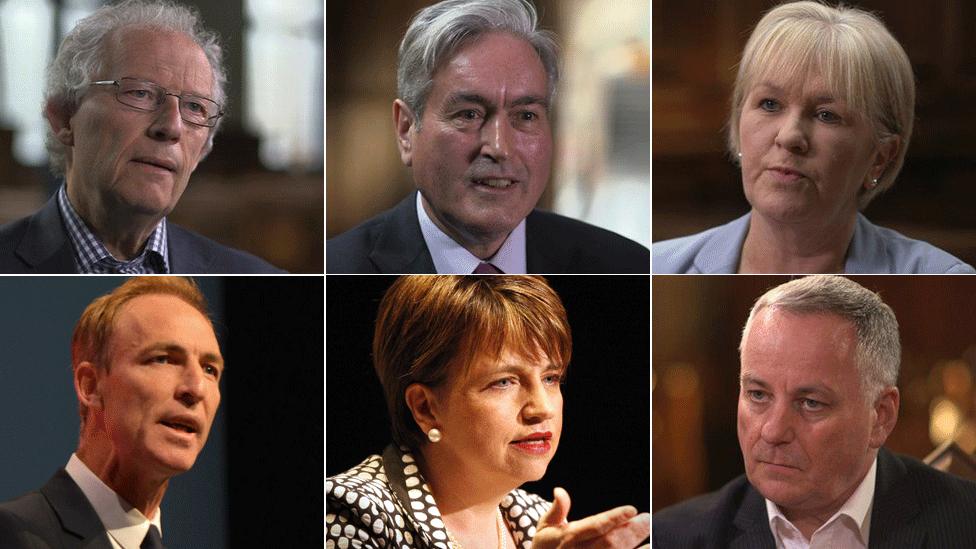Holyrood 2016: How bad could it get for Scottish Labour?
- Published

Polling suggests that regardless of the message Scottish Labour has a problem
You might think that things can't get any worse for the Scottish Labour Party after their near wipe out in the 2015 general election, when they lost 40 seats and kept just one.
But as we approach the Scottish elections on May 5th Labour are worried they could actually reach a new low.
They might lose every single one of their constituency seats in Holyrood. And there is a chance they could even be beaten into third place by the Tories.
A sentence I could never have imagined typing until a few months ago.
The PR system in Holyrood elections means that even if they do disastrously in the constituency vote they will still get quite a few seats from the list vote. But that won't save their blushes.
Politicians always try to talk up their prospects during elections. But senior Labour figures struggle to find anything to boast about.
Things are feeling better out on the streets they say - because people are no longer crossing the street to shout at them when they see a red rosette.
Voters aren't slamming doors in our faces anymore another told me. The visceral anger toward Labour has visibly decreased claim activists. They say voters don't hate us anymore - now they just dislike us.
That dislike means a lot of voters are not listening to what the party is offering at this election.
Their leader, Kezia Dugdale, came up with a bold tax policy that was meant to generate enough noise that voters would hear their offer.
But it does not seem to have worked.
Polling shows that many voters do quite like the plan to put a penny on the basic and higher rates of income tax and raise the top rate of tax to 50p. But when they are informed that is a Labour policy they tell pollsters they are less likely to vote for it.
As one prominent Scottish commentator put it - if Labour were to promise every voter in Scotland a free holiday home in Spain they'd reject the offer complaining they wanted Portugal instead.
Time for a change of leader?
There are already the inevitable rumblings about whether the young Ms Dugdale can hang onto her job as leader if the party has a particularly bad night. She has only been in the post for nine months and her inexperience has been evident during this campaign.
But Scottish Labour cannot react to every election defeat by changing their leader. That particular habit - formed with the departure of Jack McConnell in August 2007 - has seen them get through six leaders in less than 10 years and not one of those leadership changes has improved their electoral performance.
The reasons for Labour's demise in Scotland are many and varied - and certainly cannot all be laid at Ms Dugdale's door.
She did warn when she took over that the party's problems didn't start overnight and wouldn't be solved overnight.

(Top row from left) Henry McLeish; Iain Gray and Johann Lamont. (Bottom row from left) Jim Murphy; Wendy Alexander and Jack McConnell held the Scottish Labour leader post between 2000 and 2015
The independence referendum is undoubtedly a significant factor. Labour's decision to campaign alongside the Tories in the Better Together campaign damaged them.
As did their failure to offer an optimistic vision for Scotland's future inside the union whilst the SNP enthusiastically described the sunlit uplands awaiting an independent Scotland.
But Labour were in decline before that 2014 vote. They were beaten in Holyrood elections by the SNP in 2007 and 2011 - and it was only because the SNP won an overall majority in the 2011 election that they were able to call a referendum at all.
No one in the Scottish Labour Party is looking forward to a good night on Thursday.
They are just waiting to see quite how bad it might be. With the small consolation that once it is all over they have four years in which to regroup before they face another major electoral test.